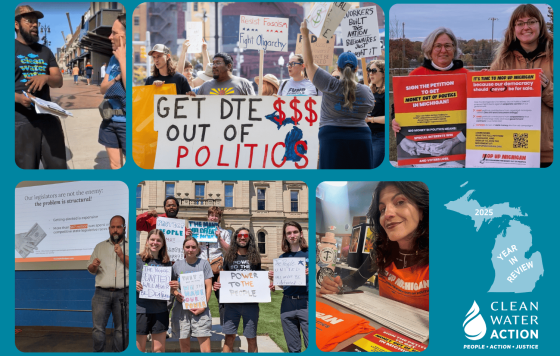
December 11, 2012 is a day I will always remember. After months of saying that so-called right to work legislation (which is just a catchier name for Betsy DeVos-funded legalized worker suppression) was not on the agenda, the Republican supermajority rammed it through a lame duck legislative session. Most of the Clean Water Action staff, myself included, were locked outside of the Michigan State Capitol, protesting alongside thousands of members of Michigan’s labor movement.
I was standing outside the State House side of the building that morning when mounted police from the Clinton County Sheriff's office began shooting tear gas into a peaceful crowd. Our staff spent most of that afternoon protesting outside the Governor’s office, singing Solidarity Forever and hoping that Snyder wouldn’t sign the bill. A few short years later, we watched a similarly shady process unfold in the repeal of Michigan’s prevailing wage law.
Protecting and strengthening the right of workers to organize is not something usually seen as a priority of environmentalists and environmental organizations, but it ought to be. For decades, a media narrative has prevailed that seeks to pit unions against the environment and environmentalists against workers, but the labor movement and the environmental movement have very similar origins and interests. The earliest strikes (and indeed, most if not all strikes today) were about wages, hours, and conditions. Working conditions are inextricably linked to the environment that workers operate in. During one of the largest early American strikes, the “Bread and Roses” strike of 1912, 36% of the adult textile workers in Lawrence, MA died before the age of 25 and their average life expectancy was just 39, largely due to the environmental and health hazards in the mills.
When both the labor movement and the environmental movement were experiencing a watershed moment in the United States in the late 1960s and early 1970s, they worked together and built grassroots power and solidarity across sectors. When the Oil, Chemical, and Atomic Workers Union went on strike against Shell in 1973, 11 of the nation’s largest environmental organizations declared a simultaneous boycott against the company. More recently in 2015, International Longshore and Warehouse Union workers in Oakland, CA worked with local environmental justice advocates to stop the building of a planned coal terminal which would have jeopardized the health of both community members and union workers.
Not only are these movements inextricably linked, but we are more powerful and are more able to create meaningful change for all working people when we stand together. When these worker suppression laws were passed in Michigan, it was done as a deliberate effort to decrease the political power of working people and increase the political power of large corporations. The wealthy corporations that benefit from union busting are often the same corporations that pollute our air and water, poisoning our communities while hoarding wealth. A tragic example of how corporations use their political power occurred in February with the East Palestine train derailment. The horrifying environmental and public health consequences to the ensuing chemical spill are still not fully known. But we do know that Norfolk Southern, the corporation responsible for this disaster, actively worked to weaken safety standards and rail regulations, and ignored the complaints and reasonable demands of union workers. Just now, two weeks into the wake of the disaster they caused, Norfolk Southern has agreed to give some employees paid sick time.
Just like the worker suppression bill from 2012, the repeal of Michigan’s prevailing wage laws was another blow to the political power and financial stability of working families. This gave unaccountable corporations a chance to make larger profits at the expense of the rest of us. Repealing prevailing wage made it easier for corporations to pay far less than union wages to workers who lack the excellent training and representation that unions provide.
When union skilled trades workers are replaced by workers who through no fault of their own aren’t properly trained, critical projects are often not done correctly and consumers suffer as a result. In Michigan recently, we’ve seen this play out in the solar industry. Pink Energy, a company specializing in rooftop solar, recently went bankrupt after incorrectly installing home solar systems in Michigan. Mistakes were made during installation that never would have been made by fairly compensated union electricians and laborers. Not only did this harm consumers who were left thousands of dollars in debt for systems that didn’t properly function, this also harmed the reputation of solar energy - a reliable and affordable energy source that is absolutely critical to the fight against climate change.
Clean Water Action is proud to stand with working families and the unions that represent them across Michigan in asking the Michigan Legislature to repeal Betsy DeVos’s worker suppression laws and strengthen the ability of workers to organize with no further delay.

